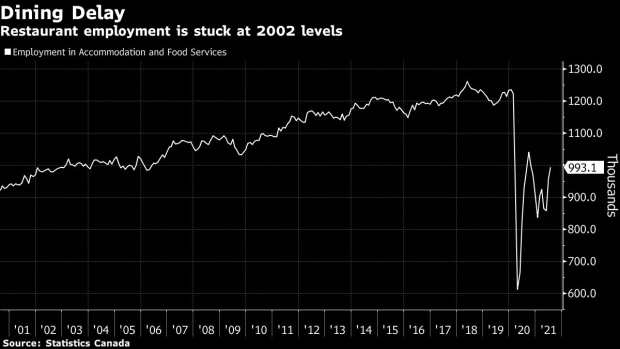Aug 6, 2021
Restaurant staff shortages put drag on jobs recovery
, Bloomberg News
It is particularly difficult to find new staff right now: Barberian's Steak House owner
Canadian jobs data on Friday show just how far the nation’s labor market has gone to fully recouping employment losses from the pandemic, and how tough the final stretch could be.
While the economy added a solid 94,000 jobs in July, bringing employment to within 250,000 of pre-pandemic levels, the numbers also show weaker-than-expected hiring in recently-opened sectors like restaurants and hotels. There’s evidence that part of the problem is supply -- many of these hard-hit firms are struggling to find staff.
“Employers are having difficulty finding people willing and able to come into work,” Doug Porter, chief economist at Bank of Montreal, said by phone. “It’s more of a challenge than normal.”

It’s a paradox -- labor shortages at a time of high unemployment rates -- that has also been a feature of the U.S. labor market recovery.
Nearly 30 per cent of firms reported shortages of unskilled or semi-skilled labor, according to a July survey by the the Canadian Federation of Independent Business. That’s the highest level on record outside of October 2018.
Data from the Bank of Canada’s summer business outlook survey show similar issues, with the intensity of labor shortages at the highest level since the fourth quarter of 2018.
The problem appears to be most acute in restaurants.
According to the latest data from job posting service Indeed Canada, listings in the food services sector are up 72 per cent from pre-pandemic levels, suggesting strong demand for bartenders, kitchen help and servers. But Friday’s jobs report shows the industry is nowhere near a return to normal.
Accommodation and food service businesses recorded a 35,000 gain in jobs last month, below analyst expectations. The industry stills account for nearly all of the jobs still not recovered from the pandemic, with employment still 20 per cent below what it was in February 2020. That compares to 1.3 per cent for the economy as a whole.
Weakness in hospitality jobs “does temper expectations of when we get back to pre-pandemic levels,” Sri Thanabalasingam, an economist at Toronto-Dominion Bank, said by phone.
Companies say they can’t find enough workers, blaming the long length of the lockdowns that’s forced many of their personnel to look for other careers.
“How do you retain those people for such a long time when you’re not operating at all?” Sarah Chown, managing partner at Metropolitain Brasserie in Ottawa, said in an interview. “That’s where I think you see more of the hiring struggles going on right now.”
Economists and others have offered a number of reasons for the shortage, including child care challenges, lingering coronavirus concerns and expanded support benefits. According to Porter, the so-called hurdle wage for workers -- or the appropriate level of compensation for risk incurred -- is higher now than before because of COVID-19.
Most believe these factors will abate in coming months. While some economists are pushing back their forecasts for when employment returns to pre-pandemic levels, it’s only by a month or two -- for now.
“My guess is it’s going to be three months before we and most others in the restaurant industry are able to open up to full capacity again,” Stephen Beckta, owner of Beckta and two other Ottawa restaurants, said in an interview.


